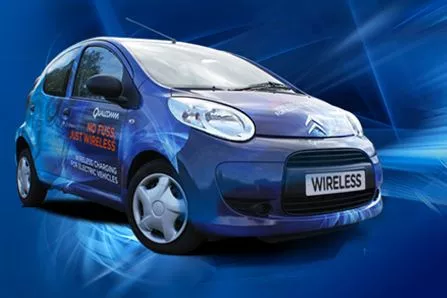
When it comes to phones, computers and other devices, when we have a choice, we almost always choose those without wires. And soon owners of electric cars may have a wireless option for charging their vehicles.
Council Lead Partner Qualcomm is developing wireless chargers for electric vehicles. It’s calling the project Qualcomm Halo and the company will talk about the progress it has made so far at eCarTech in Munich this October.
The idea is to develop technology that can work with any electric car, whether it is fully electric or a plug-in hybrid. Wireless charging isn’t a new concept for Qualcomm. It already has developed technology for consumer devices. But it says freeing electric cars from cumbersome wires could play a major role in encouraging consumers to adopt them in even greater numbers.
Electric cars help pinpoint pollution
Electric vehicles are also helping researchers measure pollution in the United Kingdom’s largest cities without harming air quality themselves. Scientists from the University of Leicester are measuring the air in various parts of those cities from electric vehicles equipped with special monitoring sensors.
They say understanding the air quality in urban areas is important to guide future policies and developments. By collecting the samples from electric cars, they can sample the air without adding to the pollution.
A city where you won’t need cars
Helsinki is trying a different approach to easing commutes and reducing air pollution. It’s working on a project that could one day make owning a car unnecessary.
One of the main reasons people drive is that cars allow them to get where they want to go directly. Transit rarely does that. At least not yet.
Helsinki is working on a new integrated transit planner that combines all forms of transportation, everything from buses to trains to carpools to taxis. Through an app, plug in your starting and ending points and you can book and pay for the entire trip with a single click or tap.
The system will even be smart enough to check the weather. If it’s raining, it will automatically know not to use bicycles for any part of the route.
It may take another decade to accomplish the vision, but Helsinki believes it will pay off. In the past, another reason people owned cars was because they were a status symbol. Transit planners say that’s not the case with younger generations. They just want travel to be easy.
Combining travel with retail
In London, transit planners are getting more people to ride the rails by adding retail to train stations. The retailers are also winning.
Network Rail has been turning dead space in its stations into vibrant retail cores with shops and restaurants. One station even has recreated the platform from Harry Potter.
The effort seems to be a success by every measure.
Network Rail’s income from retail is forecast to nearly double over the next five years. Retailers in the revitalized stations are posting sales gains of up to 6.5% at a time when merchants on the streets above are struggling. And passenger traffic is forecast to grow by about 4% per year.
###
Get Smart Cities Now, our weekly newsletter highlighting smart city trends, technologies and techniques. It's just one of the benefits you receive by joining the Smart Cities Council (and your membership is free).



